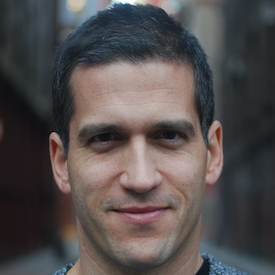Arthur Brooks is a professor of management practice at the Harvard Business School and the Parker Gilbert Montgomery Professor at the Harvard Kennedy School. He is also a columnist at The Atlantic, where he writes the weekly “How to Build a Life” column. Author of fourteen books (one of which he co-authored with Oprah Winfrey), he is known as one of the world’s leading experts on the science of happiness.
What’s the big idea?
Happiness is really all about the business of life. Your life is like a startup business, and you should manage it as such. You’re the founder, and you need to be able to take risks and know what the currency is of the fortune you’re trying to accumulate. The Happiness Files shows how to become more successful in getting what you truly want by seeing your life in this way.
Below, Arthur shares five key insights from his new book, The Happiness Files: Insights on Work and Life. Listen to the audio version—read by Arthur himself—below, or in the Next Big Idea App.

1. Manage yourself.
In the startup of your life, you’re the most important employee—so you better manage yourself. Self-management is a skill that successful people have. More importantly, it’s a skill that happy people have. Some people are very successful in managing their professional lives, but managing their personal lives is a different kettle of fish. In the first section of my book, you will learn why these things are different and why some people find self-management more difficult than professional management.
This section also talks about philosophy and religious faith, friendships, family, romantic relationships, and how these don’t have to feel different than getting ahead at work. You can treat them in much the same way with a few basic ideas that are taken from neuroscience and behavioral science.
This section also deals with burnout. Are you spending time at work on boring or inconsequential things? Do you feel unappreciated? What do you do about that? You need to understand yourself and why you’re stuck in unproductive patterns. This section walks you through each problem that blurs the line between personal and professional in such a way that you can resolve some of these issues without feeling burnout.
By the way, what is happening in your brain during burnout? You’ll find out, and this will help you put on your own oxygen mask first so that you’ll be more successful in your job and in your life. Then we can move on to how do you build your career once you’re able to be a great employee to yourself.
2. How to build your career.
A lot of people think of their twenties as the building phase of their career, but the truth of the matter is that in the business of your life, building is an ongoing operation. A career is always a process of exploration and discovery. You’re probably different than other people, and this part of the book will tell you how to identify yourself. Do you have the kind of linear career where you go from one thing to the next, where everything that you do is bigger and better and grander than the last? Maybe you’re more of a spiral, where your career is a set of mini-careers of seven to 12 years, and sometimes you make more money and sometimes less, but you’re setting it up as an adventure of your own making.
“A career is always a process of exploration and discovery.”
This section will also help identify when the right time is to switch jobs. A lot of people struggle with this. They’re afraid of these kinds of changes. I don’t like my job, but will I be happier? The data says you probably will be. I hope that this part of the book will give you the courage. If you’re considering a career change, we’ll discuss how to trust your instincts. As a matter of fact, I will give you a rubric—a tool that explores what you should be listening to in your own feelings.
3. How to communicate and connect with others.
One of the most important skills to develop is the ability to deal with other people. Communication and connection, at both work and home, are about managing the enterprise of your life and having an enterprise that gets better and better as the years go by. This is the third section, where you’ll learn how to give and receive criticism, based on the best communication literature and social psychology. What does good criticism look like? Also, how do you give a great compliment? How do you talk to people that you don’t know? If you’re an introvert, how can you sometimes act as if you’re an extrovert?
Another thing you’ll learn in this section is where you should not connect and communicate with other people, if possible. The answer is meetings. I’m going to arm you with data that shows you should eliminate as many meetings as possible. Want to be happier? Stay away from meetings and avoid making calls whenever possible.
4. How to balance work, life, and relationships.
I hate the expression “work-life balance” because it sounds like you have to balance two separate things. The truth is, if you want to be happy in the enterprise of your life, your work and your life are part of the same phenomenon. Work should be part of your life. That being said, it shouldn’t be all of it—you should have other things in life that are not involved with your job, such as family and friendship. Instead of work-life balance, I talk about work-life integration.
“If you want to be happy in the enterprise of your life, your work and your life are part of the same phenomenon.”
We want work and life to work together. As it says in The Good Book, iron sharpens iron. Your work and the rest of your life should be the iron that sharpens each other. In this section, you’ll find out how successful people do it, but more importantly, how happy people do this. What are the boundaries? Where does work stop and life start in a way that actually makes both work and life better? What’s the best way to work with people that don’t understand this? What do you do about colleagues that might make life a bit worse?
5. How to define success.
Success is what you want. At the end of the day, with any kind of startup, you’d better know what the end goal is and you’d better keep it in mind. If you’re starting a little company, you might say success is getting bought by some bigger company or getting to the initial public offering. Well, how do you define success for the startup of your life? What does success mean to you? Hint: don’t denominate it in dollars if you want to be a happy person. This is not to say that money is unimportant. Quite the contrary. It’s very important for doing all kinds of things, but it is not a great metric for understanding our own personal success.
Success can lead to misery if you’re only focused on money, power, pleasure, fame, prestige, titles, or positions. Those things are intermediate goods to what we really want, which are things like love, satisfaction, or faith. How do we define that kind of success? How do we measure that kind of success? Picking a meaningful metric will not make you lose your edge. On the contrary, when you know the success that you’re shooting for and how to measure it, boy does that make you want to show up for work and do your very best every day. Then, it makes you want to go home and do your very best at home as well.
For the business of your life, you need to always be making progress. How? I’ll talk an awful lot about that in the book. It’s been useful to me because my life, like yours, is a startup, and I want you to be able to make yours the most gloriously successful startup you can possibly imagine. That’s the job of this book.
Enjoy our full library of Book Bites—read by the authors!—in the Next Big Idea App:
































